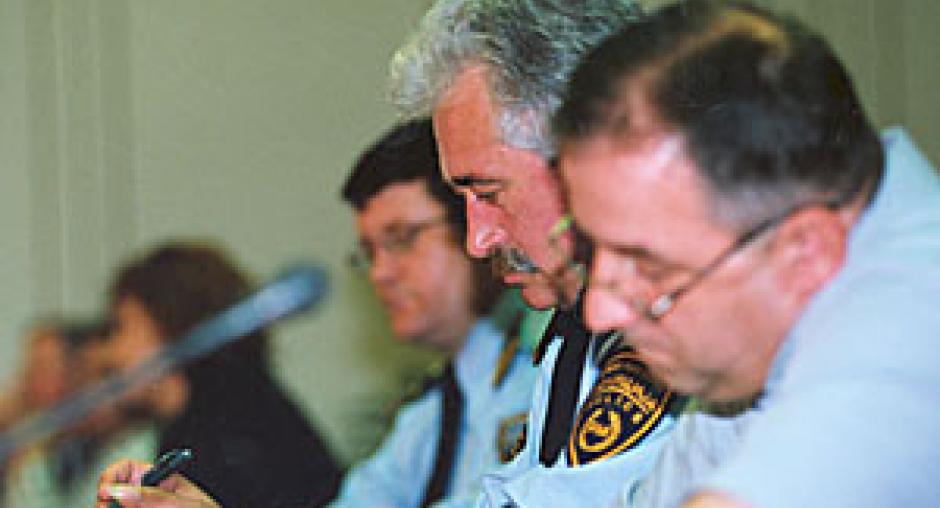Newsroom
Community policing conference in Skopje identifies new solutions to old problems
SKOPJE 15 May 2002

(OSCE)Participants of a community policing conference held on 9-10
May
2002 in Skopje noted the importance of communication between
police, media and citizens. (OSCE) Photo details
SKOPJE, 15 May 2002 - Implementation of community policing requires increased confidence between Macedonian citizens and police, concluded participants in a Community Policing Conference organized last week by the OSCE Spillover Monitor Mission to Skopje. According to the conclusions reached in four working groups, this can best be achieved through community involvement in the work of police, and through organizing local partnership between citizens and police.
Participants in the conference included representatives of the Macedonian Ministries of Interior, Defence, Foreign Affairs, Justice and national non-governmental organizations, and representatives the OSCE, EU, USA, UK (which sponsored the event) and other international organizations and embassies. The keynote speaker was Ambassador Kay Eide, former Head of the United Nations Policing Mission in Bosnia and Herzegovina, who stressed the importance of community based policing in the process of integration into European and Euro-Atlantic structures.
The Conference participants recommended the establishment of steady lines of communication between police, media and citizens. Regular meetings of police and media, informing the public about the work of the police, re-establishing local police officers, and having "open house" events in police stations were suggested as effective means of communication. Participants also agreed that domestic non-governmental organizations and media, as direct representatives of citizens' interests, have an important role in improving community partnership with the police. To promote partnership between citizens and police, participants in the conference recommended that the role of police as "public servant" be emphasized. They also suggested the setting up of community-based forums, as a means of identifying local problems and working together to address them.
"This Conference indicates that both police and civil society actors, regardless of their ethnic background, recognize the need to jointly work to create a safe and secure environment for all citizens", said Ambassador Craig Jenness, Head of the OSCE Mission. "Conclusions and recommendations of the Conference provide a solid basis for community-based policing development, which in its essence means co-operation between citizens and police, aimed at serving the needs of the community. Multi-ethnic, community-based policing is the only way forward to Europe."
General Goran Mitevski, Director of the Public Security Directorate of the Macedonian Ministry of Interior, said community policing was not a novelty to the Ministry. Projects on community policing were prepared before the conflict and during the mandate of the previous Minister of Interior, when a decision was made to include 500 ethnic Albanians in the police force. "Future projects will be implemented in co-operation with the international community which will ensure better communication between the heads of police departments or police stations with representatives of local authorities, which will increase the transparency of the work of the Interior Ministry", Mitevski said.
Recommendations of the Conference were forwarded to the Ministry of Interior. The conference will be followed by the establishment of the Community Policing Steering Committee that will provide management, guidance and direction to the Community Policing project.
Participants in the conference included representatives of the Macedonian Ministries of Interior, Defence, Foreign Affairs, Justice and national non-governmental organizations, and representatives the OSCE, EU, USA, UK (which sponsored the event) and other international organizations and embassies. The keynote speaker was Ambassador Kay Eide, former Head of the United Nations Policing Mission in Bosnia and Herzegovina, who stressed the importance of community based policing in the process of integration into European and Euro-Atlantic structures.
The Conference participants recommended the establishment of steady lines of communication between police, media and citizens. Regular meetings of police and media, informing the public about the work of the police, re-establishing local police officers, and having "open house" events in police stations were suggested as effective means of communication. Participants also agreed that domestic non-governmental organizations and media, as direct representatives of citizens' interests, have an important role in improving community partnership with the police. To promote partnership between citizens and police, participants in the conference recommended that the role of police as "public servant" be emphasized. They also suggested the setting up of community-based forums, as a means of identifying local problems and working together to address them.
"This Conference indicates that both police and civil society actors, regardless of their ethnic background, recognize the need to jointly work to create a safe and secure environment for all citizens", said Ambassador Craig Jenness, Head of the OSCE Mission. "Conclusions and recommendations of the Conference provide a solid basis for community-based policing development, which in its essence means co-operation between citizens and police, aimed at serving the needs of the community. Multi-ethnic, community-based policing is the only way forward to Europe."
General Goran Mitevski, Director of the Public Security Directorate of the Macedonian Ministry of Interior, said community policing was not a novelty to the Ministry. Projects on community policing were prepared before the conflict and during the mandate of the previous Minister of Interior, when a decision was made to include 500 ethnic Albanians in the police force. "Future projects will be implemented in co-operation with the international community which will ensure better communication between the heads of police departments or police stations with representatives of local authorities, which will increase the transparency of the work of the Interior Ministry", Mitevski said.
Recommendations of the Conference were forwarded to the Ministry of Interior. The conference will be followed by the establishment of the Community Policing Steering Committee that will provide management, guidance and direction to the Community Policing project.
